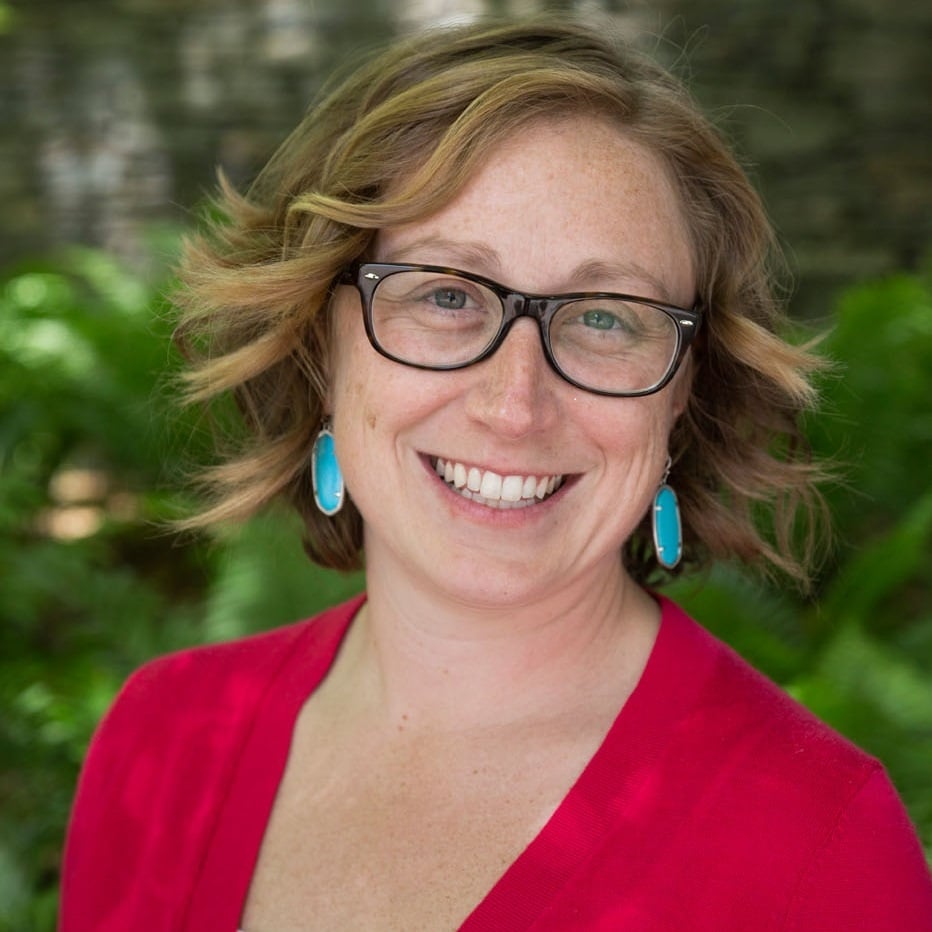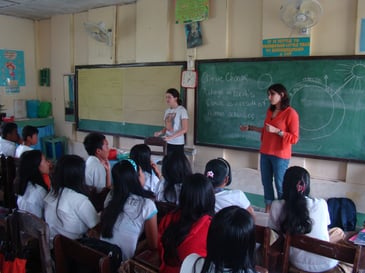Mission-Driven: From the Military to Sustainability with a Graduate Degree from Bard

Antonio was on active duty in the Army for nearly two years before finishing his military career as a reservist. Mike completed two tours in Iraq as an Army artillery officer. And Nick and Tim both served in the Navy—Nick as a pilot and Tim as a missile guidance technician. All four decided on a post-service career in sustainability. The route to get them there? The Masters' Programs in sustainable business and policy at Bard College in New York.
At age 18, Tim Treadwell didn't want to head right to college, and so, like his father and grandfather before him, he enlisted in the Navy. Post 9-11, he was deployed on the west coast of the US, helping ensure that no more airplanes would be used as suicide bombs. After his service, he made the move to college, studying natural resource management where he loved working in the field. But after graduating, he was motivated to drive change with a bigger impact—at a larger scale.
Nick Hvozda attended the US Naval Academy, earning a degree in Mechanical Engineering. However, he never saw duty on a ship. Instead, he became a Navy pilot, flying long-duration surveillance and search flights out of Air Force bases in Qatar and other locations. Nick’s Navy plane burned 750 gallons of fuel in a single hour. In civilian life, it would take him more than a year and a half of driving to consume that much transportation fuel. Educating himself about sustainable energy, Nick used the Navy’s Transition Assistance Program to evaluate his post-service options. He targeted work promoting renewable energy as his career goal.
Like Nick and Tim, Mike Amoroso started his military career right out of high school, attending and graduating from the US Military Academy with a degree in economics. His career included multiple tours in Iraq, as well as National Guard service that saw him deployed on a peace-keeping mission to the Egypt-Israeli Border. A memorable project for Mike was working with Iraqi’s to provide low-cost generators to families, increasing access to electricity, creating jobs, and helping stabilize the economy. After the military, Mike worked a number of jobs in the private sector but found he was missing what he most enjoyed about the Army: the mission.
Antonio Castillo, on the other hand, began his career in the military later than the other three. He grew up in the San Fernando neighborhood of Los Angeles, CA, which, at the time, was one of the poorest and most marginalized communities in the area. After graduating high school, he began his freshman year of college at UC Davis.
It was during that year that he realized his student loans were amassing some serious debt. A first-generation college student with no family wealth nor a sponsor to speak of, the military's education bonus coupled with the GI Bill was ultimately what convinced Antonio to pivot away from education for a few years. Once he completed his service, he returned back to school, graduating with a BS in Psychology, and finished his military career as a reservist. His interest in sustainability didn't truly blossom until a few years into his first job. As an Environmental Compliance manager, the sustainability projects he worked on became an "Aha!" moment for him. He started recognizing the importance of integrating sustainability into an overall business strategy to not only manage and reduce the environmental impact but to enhance the overall bottom line of the company.
Tim, Nick, Mike, and Antonio all came to Bard to advance their purpose-driven careers. Bard offers four different degree programs in sustainability, each with a different underlying theory of change. The M.S. Degrees in Environmental Policy and Climate Science and Policy are for people who want to “change the rules.” Graduates work in and around the city, state, federal, and international government, within private sector businesses, and in non-profit organizations. Whether working in government, private, or non-profit arenas, our graduates work to amend outdated laws and policies and create new ones to drive sustainable outcomes.
The M.Ed. in Environmental Education is for folks working to “change minds.” Graduates find jobs helping build out and lead in-school, after-school, and summer programs helping K-12 students achieve ecological literacy.
Finally, the MBA in Sustainability degree is for future business leaders who plan to “change the game.” Bard’s program is one of the top graduate programs in the world that fully integrates a focus on mission-driven business and sustainability into a core MBA. Based in NYC, the program teaches students how to put the purpose of business first, and have financial success follow
Tim decided he wanted to “change the rules” around energy, so he enrolled in the Masters of Science program in Environmental Policy. Two unique features of the program helped accelerate his career. Bard believes that sustainability cannot be taught in the abstract: it is a problem-solving discipline. To that end, all of our programs feature highly experiential education. The Bard M.S. degrees are unique in the US in that they require all students to complete a 4-6 month, high-level professional internship as part of the program. So from June to January of their second year, all of our students are working in full-time internships: in Australia, Thailand, Geneva, South Africa, New York City, Alaska, or Washington D.C. While away on their internships, students are engaged in conversation with their capstone advisors, and in the second half of the final year, they complete a master's project or thesis based on their internship.
Tim completed his second-year internship at an Energy Services Corporation in New York City, consulting with other companies to help them pursue energy conservation and efficiency strategies. The business liked him so much that they hired him into a full-time job—not an unusual outcome for Bard students. (And even if the internships don't turn into jobs, Bard graduates have a major leg-up because of the real-world experience they gain in the program.) Tim subsequently moved to California, where he rose to a management position at an NGO focused on renewable energy and public policy. He recently took a new job heading the Smart Grid testing program at the biggest utility in Oregon.
Tim credits another key feature of the Bard program in preparing him for his success in these leadership roles. To set students up for the second-year internship, Bard’s M.S. degrees compress most of the academics into a highly integrated, first-year, interdisciplinary core curriculum. At Bard, Tim took courses in environmental science, environmental and natural resource economics, environmental law and policy, and a key set of tools: econometrics, statistics, and GIS. The classes are modular and integrated, so when Tim studied air and atmosphere in his science classes, he was also doing so in economics, policy, and law—similar with energy, biodiversity, and other topics. Tim found this integrated, interdisciplinary approach to problem-solving to later be critical for his work in the energy field.
Tim started out in the “change the rules” world of energy policy analysis and implementation. He has now migrated over to “changing the game,” helping design business models to support a rapid transition to clean energy. Nick, too, was interested in a career in renewable energy, and so he enrolled in Bard’s MBA in Sustainability.
Something else also attracted Nick to the MBA program: it is designed for working adults and is offered in a hybrid, low-residency format. Nick attended the part-time, three-year version of the Bard MBA, where classes meet one extended weekend each month in NYC: three ten-hour days, Friday morning through Sunday afternoon. These monthly face-to-face classes are supplemented by online courses on Tuesday and Thursday evenings, in a live, webinar format.
This hybrid structure allowed Nick to continue working full-time. It also meant he had classmates from Los Angeles, Boulder, Atlanta, and Houston, with some of his fellow students flying in once each month for classes. And by doing the program part-time, the Veterans Administration covered his entire tuition. The staff at Bard helped Nick work with the VA to obtain all the benefits he was due.
Like the other graduate degrees at Bard, the MBA is also highly experiential. All students are required to take a year-long consulting course, where they work on a team for nine months for a real-world business on a sustainability challenge. Clients have included Jet Blues, Siemen’s Wind, Unilever, UBS, Nasdaq, and Cliff Bar. Nick’s project was developing a sustainability strategy with Con-Ed Solutions. Nick really valued the way that Bard’s team projects immersed him in a civilian community and helped him learn the language of sustainable business.
For his MBA capstone, Nick spent a year developing an entrepreneurial start-up, which focused on founding a wood-pellet heating business designed as a sustainable alternative to fuel oil in New York’s Hudson Valley. However, no matter how he ran the numbers, Nick concluded the business just would not pay. After exhaustively and effectively proving a negative, the faculty awarded Nick the top award for an MBA capstone project that year.
After graduating, Nick now works helping lead the Department of the Environment for his home county in upstate New York. Here he continues to drive renewable energy, as well as tackle issues in green building and waste management.
Both Mike and Antonio are newer to the MBA in Sustainability program. With three of his classmates, Mike is already digging into developing a business proposal to bio-remediate toxic soils in urban brownfields. Antonio attends part-time, allowing him to work his full-time job at Advanced Bionics, a medical device manufacturer of cochlear implants and hearing sound processors. In his current role as Environmental Manager, he manages both the environmental and sustainability programs of his company. He brings his real-world experience to the program and his classmates.
For Antonio, the Bard MBA in Sustainability program aligns with his vision of how he wants to become a business leader, citing the holistic approach to integrating managerial, financial, and leadership skills with the principles of sustainability and social responsibility—and having all of that be at the core of his decision-making. He wants to be the kind of sustainability business leader who influences other leaders to adopt strategies that support a more equitable and regenerative economy. He believes that the Bard MBA in Sustainability will get him there, and so do we.
When asked why he made the move from the military to sustainability, Mike said: “This is what we're good at. Military personnel are baptized in facing multifaceted systems problems, and working cross-functionally with people from different backgrounds to achieve impossible goals. We have, what, ten years to solve climate change? My Bard MBA is going to differentiate me from my peers at other schools: we are going to be multipliers for our companies when we graduate.”
If you're a veteran and interested in learning more about Bard's participation in the VA Yellow Ribbon Program, please click here to schedule a call with our Admissions Director today.






